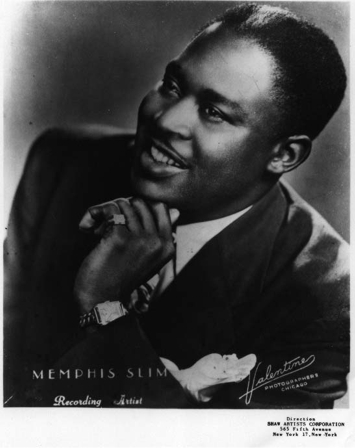
Revision note: We have corrected our account of Lee Egalnick's last spin in the record business. He did not start the Topper label, which put out two releases in June 1952. He was involved, as a representative of Premium Music, with one side of Topper 202 and with both sides of Topper 204. 204, the company's last single, came out in September 1952. We have also sketched his life after he left the music business and moved his family to Houston, Texas. We are still updating our coverage of Premiums that were reissued on Chess. Courtesy of Dan Ferone, we have label copy for Premium 863, by Mickey Carter, and we can finally report on the music.
Premium was an immediate successor to the Miracle label, which by February 1950 could no longer afford to record at United Broadcating Studio. Miracle was completely out of business by May. At Premium the principals were still Lee Egalnick and Lew Simpkins, and several artists on the roster had previously recorded with Miracle. Their new company lasted a little over a year, before inadequate sales did it in.
In May 1950, Lee Egalnick left Miracle, the company that he had founded in the summer of 1946, and founded the Premium label. The trade papers, inaccurately as it turns out, described the leaving as "a severing of ties with his partner Lew Simpkins." Premium's address was 2326 South Michigan Avenue, on an incipient "Record Row." Billboard reported that the first releases were by the Lynn Hope Quartet (which never ended up on Miracle), Miff Mole's Dixieland Quintet, and Memphis Slim. Premium was a family enterprise: "Lee Egalnick, Premium disks, introduced his brother, Charley, the new sales manager, to the convetion" ("NAMM Notes," Billboard, July 28, 1951, p. 24).

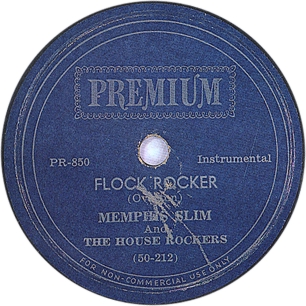
Memphis Slim (whose group at this point consisted of Slim, piano; Alfred Elkins, bass; Alex Atkins, alto sax; Timothy Overton, tenor sax; and Leon Hooper, drums) was the most important carryover from Miracle; he continued to be a mainstay of Egalnick and Simpkins' operations.
In March Slim's combo did a marathon session (one that could have been spread over several days) that ended up for the benefit of the new company. Several of the pieces (even one titled "Having Fun"!) seemed intended to capture the Charles Brown market. On two numbers Floyd Hunt played piano in Slim's place—a substitution that couldn't have happened terribly often. Hunt's involvement makes sense on "I Guess I'm a Fool," a cocktail ballad to which a vocal group also contributed. The group was billed as the Vagabonds, but this was not the 4 Vagabonds who had recorded for Miracle in June 1949. It actually consisted of former Vagabond bass singer and guitarist Ray Grant, who had left around 1949 to form his own group, and 3 new vocalists recruited for the session. (While Miracle was still extant, Billboard had announced, on January 28, 1950, the signing of Grant's group The Swanee Larks. The group no longer existed by this time, but Grant was available.) Hunt also took the piano bench on "Really Got the Blues" (for which he shared the composer credit). The most noteworthy release from this session was the distinctive blues "Mother Earth," which used the vocal group effectively; of everything that was done for Premium, "Mother Earth" is the most widely known side today. (For information about the vocal group, see Rick Whitesell, Pete Grendysa, George Moonoogian, and Marv Goldberg, The 4 Vagabonds, http://www.uncamarvy.com/4Vagabonds/4vagabonds.html).
Not long after it was released, Premium 867 ("Mother Earth" b/w "Really Got the Blues") cracked Billboard's top 10 chart of "Most Played Juke Box Rhythm & Blues Records" for January 20, 1951 (p. 24). It was number 9.
A followup session in May 1950 seems not to have turned out so well; no releases came of it while Premium was still around.
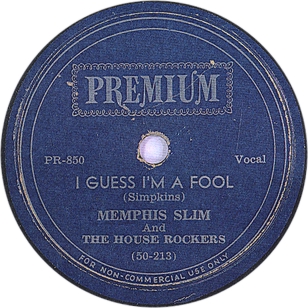
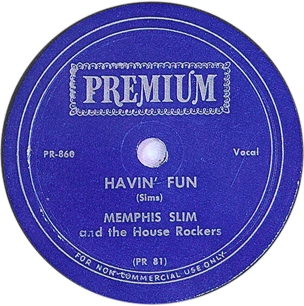
Miff Mole (1898-1961) was a veteran jazz player. He had been the top trombonist in New York in the 1920s, until Jimmy Harrison and Jack Teagarden came along and started making him sound old-fashioned. By 1950 his powers were somewhat eroded by excessive drinking; like many older jazz musicians, some not originally identified with the genre, he had turned to Dixieland to make a living. Mole's releases were optimistically marketed in Premium's "Dixieland Series." They would be the only entry. The next year Mole joined the house band at the Jazz Ltd. club, which specialized in Dixieland; in 1951 he recorded a 10-inch LP for Jazz Ltd. that was released in 1952 on Atlantic. Among Mole's last recordings was an LP cut in New York City in 1958, but released on the Stepheny label out of Evanston, Illinois.
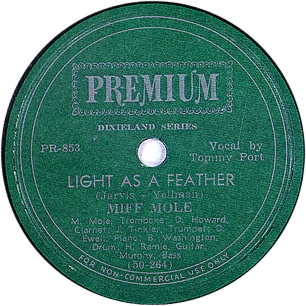
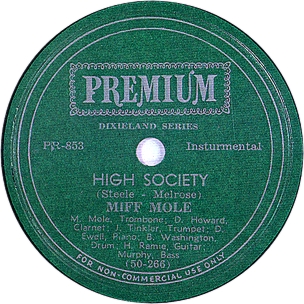
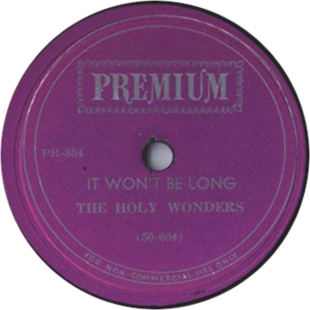
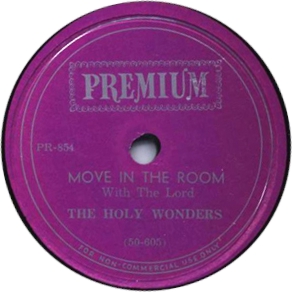
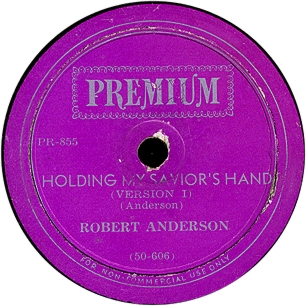
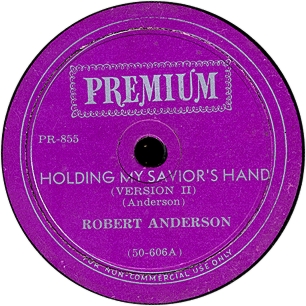
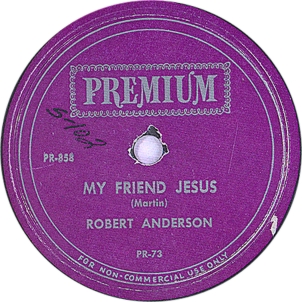
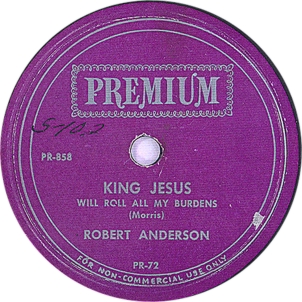
In June, Simpkins closed up shop at Miracle and rejoined Egalnick at Premium as the A&R chief, and the label signed harmonica bluesman Rhythm Willie and gospel singer Robert Anderson. At first Egalnick recycled Robert Anderson material that had already been released on Miracle; Premium gospel releases from 1950 showed up on a distinctive purple label, instead of the green or dark blue ones otherwise in use. In July, Billboard noted that Egalnick had signed the Holy Wonders, a gospel group who split one session with Robert Anderson, and Miracle veteran Eddie Chamblee. Premium's only release on the Holy Wonders is a high quality gospel record that must have done poorly at the cash register, as it is extremely rare today.
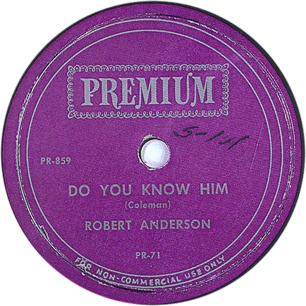
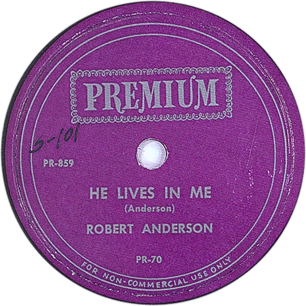
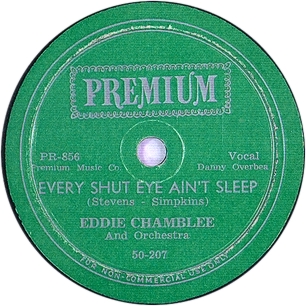
In July, Eddie Chamblee recorded four more sides. One of these was "Every Shut Eye Ain't Sleep," which featured the disk debut of vocalist Danny Overbea, born January 3, 1926 in Philadelphia. Overbea played guitar under Walter Dyett at DuSable High School, but, as he confessed to interviewers later, on he was terrible and was rarely allowed to play. After serving in World War II, he returned to Chicago and played guitar and sang as a member of trios in the clubs.
"Every Shut Eye" is a typical jump blues of the period. Overbea gives a good accounting and then there's a nice long break for Chamblee to blow. Overbea claimed that members of the Red Saunders band were in the background, while Leadbitter and Slaven have Eddie Chamblee on tenor sax, John Young on piano, Walter Scott on guitar, Andrew Harris on bass, and Osie Johnson on drums. Alto and baritone saxes are also audible on the session, however, and the boogie piano on "Sweet Lucy" isn't the John Young that we know. Moreover, the rhythmic feel is unusual for an Eddie Chamblee session during this period, and no guitar is audible! (This all makes even more sense when we realize that several of Chamblee's regular bandmates had not yet received full payment for their work on the January 1950 session for Miracle.) "Sweet Lucy" is a blowing vehicle for the leader's booting tenor. What we hear is a Saunders unit with Porter Kilbert, alto sax; Mac Easton, baritone; Earl Washington, piano; Jimmy Richardson, bass; and Saunders, drums. The Sarah McLawlers (see below) appear to have used the same lineup, except that McLawler played the piano herself, on one side at least and maybe on both.
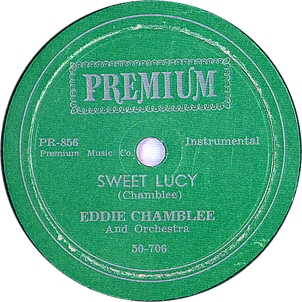
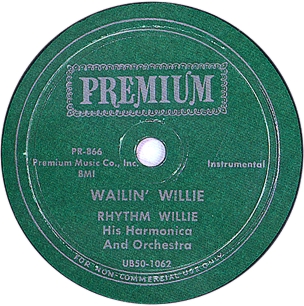
Rhythm Willie, whose real name was William Hood, had been performing in the top black and tans in Chicago since 1938, particularly at the Club DeLisa. He began recording in 1939 behind bluesman Peetie Wheatstraw, and was responsible for one previous recording session as a leader: Rhythm Willie and His Gang, consisting of Willie on harmonica and piano, with unidentified bassist and drummer, cut four sides for OKeh on October 10, 1940, all of which were released.
The two sides Rhythm Willie did for Premium in September 1950 were not accompanied by Memphis Slim and His House Rockers, as discographers have surmised in the past. Nor is Red Saunders' band involved; by the time of the Rhythm Willie affair Red had signed for three years with Columbia (later OKeh), which could have been a deterrent to using him on more sessions. A listen to dubs provided by Mike Kredinac makes clear that the "Orchestra" behind Willie was a strictly bebop aggregation, complete with bomb-dropping drummer, spiky, chord-feeding pianist, Ornithological alto saxophone soloist on "Wailin' Wille," bop riffs on "I've Got Rhythm," and a chase chorus on the same tune between a Cecil Payne-style baritonist and a tenor saxophonist who sounds a bit more old fashioned (roughly like Budd Johnson). "Wailin' Willie" (UB50-1062) was a version of the Swing classic "C-Jam Blues" which he had been performing for several years (interestingly, Premium didn't bother to put a composer credit on it). "I've Got Rhythm" (UB50-1063) was the George Gershwin standard, which--according to Scott Dirks in his definitive Rhythm Willie story in Blues & Rhythm 127 (March 1998)—"in Willie's hands became a vehicle for some swinging, spirited improvising at the top end of the harp."
Rhythm Willie appeared regularly in the Chicago clubs during this period. Most of his appearances cannot be tracked on the Local 208 contract list, because for many years the Musicians Union did not accept harmonica players (the rationale: they weren't playing a "real" instrument!). However, we know that Willie booked into the Brass Rail (in the Loop) for 3 weeks in November 1952 (contract accepted and filed on November 6), and that he landed a gig at the Hollywood Show Lounge in March 1953 (indefinite contract posted on March 5). In August 1953 he went into the Toast of the Town as part of a revue that featured Danny Overbea and the King Kolax combo (indefinite contract posted on August 6). Unfortunately, Rhythm Willie's reputation as a harp virtuoso was fully matched by his reputation for consuming vast quantities of alcohol, and he died prematurely in 1954, around the age of 45. (Note: the Premium master numbers that we have are in conflict with the numbers for two Terry Timmons sides. The Rhythm Willie records really do carry the matrix numbers that we have listed, meaning that the Terry Timmons numbers, which were almost certainly recorded at the same session with the same band, are probably in error.)
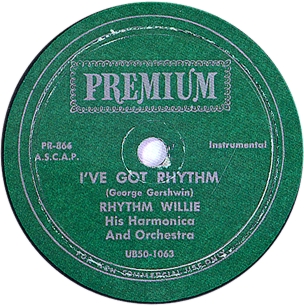

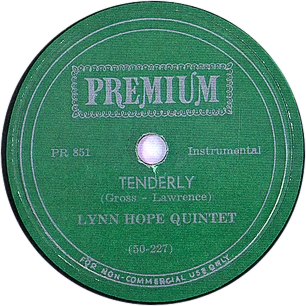
Meanwhile, Premium was truly launched when Lynn Hope's tenor sax ballad "Tenderly" became a national hit. It sold steadily throughout the year, even making a showing in the pop (as opposed to R&B) charts. ("Tenderly" entered the Billboard pop charts on August 26, 1950 and stayed three weeks, rising to #19.) Hope was born September 26, 1926, in Birmingham, Alabama. On graduation from high school he joined the King Kolax band (probably in 1943). He played in King K's last big band in 1947, along with Joe Houston and Vernel Fournier, and he came to Chicago to work in a combo with Kolax in 1949 and early 1950.
Before his first session for Premium, Hope formed his own band with his brothers and sisters. At some point in the late 1940s, he had converted to the Muslim faith, taking the name Abdullah Rascheed (this was given several spellings in the Roman alphabet), and several members of his family followed suit. Thereafter, although he continued to use his birth name professionally, he was always seen wearing a turban. Both sides of Premium 851 are designed to showcase the tenorist; on the uptempo "Song of the Wanderer" the only other solo is by the guitar, which gets one little break. Hope shows off his deep tone, good ideas, and a sense of drama (playing an unaccompanied cadenza, or a passage in duet with the drums). Unlike some other sax-solo releases for the popular market, Hope's hit record doesn't drench the proceedings in studio reverb.
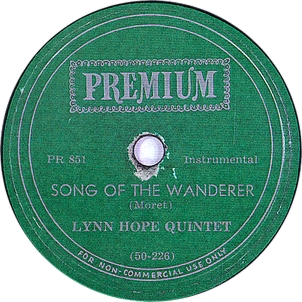

Probably in August, Premium brought Lynn Hope back into the studios; his version of "Mona Lisa" was presumably inspired by the Claude McLin hit that had just come out on Chess.
From this propitious beginning, Hope would build a successful career doing mellow jazz renditions of standards for Aladdin from 1951 to 1957. Hope probably liked the idea of recording with a label called Aladdin. He cut his first Aladdin sides in Chicago but after he moved to Philadelphia in 1952 the company recorded him in New York City. He went to Mecca for the annual pilgrimage, or hajj, in 1952, a very early date for an African-American Muslim; subsequently he used the honorific Al Hajji. His final session for Aladdin was delayed because of a sojourn in Egypt and Lebanon that lasted more than a year. With the rise of rock and roll, Hope's music went out of fashion, his family band broke up, and by the end of the 1950s he was out of money and periodically in trouble with the law. In a comeback attempt, he recorded two sessions for King in 1960. But by the mid-1960s, he was out of music entirely. Lynn Hope died in Southern New Jersey in 1993.
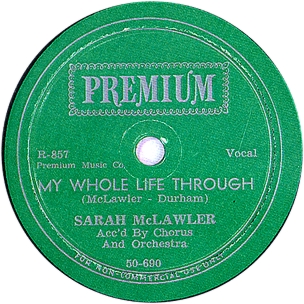
In the summer of 1950, Premium added to its artist stable Sarah McLawler, who sang and played the piano. She was born August 6, 1926, in Louisville, Kentucky, and graduated from Crispus Attucks High in Chicago. She became interested in jazz at Fisk University in Nashville, where she studied organ and music theory. She first worked as a soloist in Chicago clubs, but around 1948 formed an all-female combo. Her band, as reported in April of 1949 in the Chicago Defender during their engagement at the Blue Heaven on 63rd Street, included McLawler on piano, Hetty Smith on drums, Vi Wilson on bass, and Lula Roberts on tenor sax. When one of the girls got married, McLawler disbanded her combo and went solo again.
On her sessions for Premium she played piano and sang. "My Whole Life Through" features a vocal group, along with tenor sax, guitar, bass, and drums. On "It's the Truth" the vocal group is dropped and three saxes (alto, tenor, and baritone) can be heard, for instance on the opening notes of the piece. This is almost certainly the same Red Saunders ensemble that backed Eddie Chamblee and Danny Overbea for Premium, though here Chamblee is replaced by Red's tenorist, Leon Washington. We weren't previously able to put a release date on Premium 857, McLawler's only single for the label, but a quick Chicago item in Cash Box (November 18, 1950, p. 9) had "My Whole Life Through" "getting hot on the southside." OK, it was for sale there…
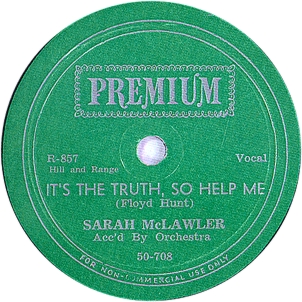
McLawler moved to New York in 1951, switching to organ soon afterward. She made a couple of singles for Coral (a Decca subsidiary) in 1953. From 1953 to 1965, she maintained a trio with the unusual instrumentation of organ, violin, and drums. Her husband Richard Otto was the violinist, while at different times Robert Brooks and Tommy "Bugs" Hunter (1927-1999) occupied the drum chair. Hunter, who recorded with McLawler in 1957 and was her regular drummer from 1961 to 1964, was a Max Roach disciple. He had worked in Chicago in Lil Green's band (alongside a pianist named Herman "Sonny" Blount) in 1947, rehearsed in some of Sunny's first experimental ensembles in 1950, and later, in 1961, rejoined the Sun Ra Arkestra in New York. He is best known today for recording the Sun Ra albums of the early 1960s on his old Ampex tape machine. McLawler and Richard Otto made frequent stays in Chicago, where the trio was sometimes expanded for recording sessions. They recorded for Vee-Jay on two dates in 1956, yielding 2 singles. They returned to Chicago for two-day, album-length sessions in 1957, 1958, and 1960. (Anthony Barnett's discography of the McLawler Trio can be seen at http://www.abar.net/otto.htm.)
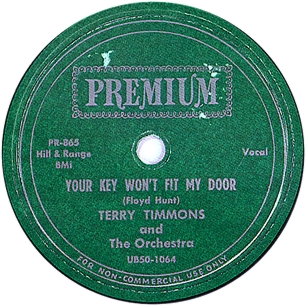
Around August 1950, Premium signed beautiful thrush singer Terry Timmons. who had what was described as a "rich expressive blues voice." To our ears, she was one of the top singers of the period. On blues and ballads she resembled the young Dinah Washington, albeit with a tone slightly less tart, and on Swing numbers she occasionally reminds the listener of Ella Fitzgerald. We are puzzled how a singer with this kind of vocal equipment did not enjoy more popular success. Timmons was born Teresa Walker in Cleveland, Ohio, on April 12, 1927, shortly after her parents and two older brothers moved to that city from Charleston, West Virginia. She first sang in public while attending high school in Cleveland. Her first professional experience was with the Paul Gayten band out of New Orleans. She recorded four sides in her first session for Premium, two of which were released in December. An ad in the Chicago Defender, August 19, for Ralph's Club (2159 West Madison) is billed "Memphis Slim and His House Rockers featuring (The Premium Recording Artist) Terry Timmons, vocalist." "Doctor" Jo Jo Adams was the other guest vocalist with the House Rockers at the time.
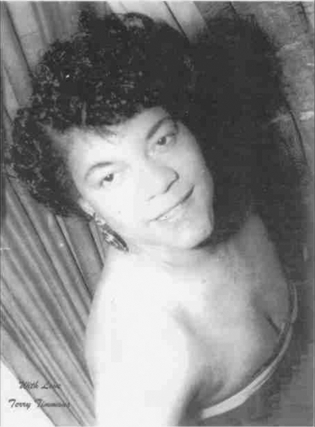
Her first session took place in September. They were under contract to Premium, but Terry Timmons was not accompanied by Memphis Slim and the House Rockers. Instead she recorded with the same bebop orchestra that backed Rhythm Willie: two trumpets, probably two alto saxes, tenor and baritone saxes, piano, bass, and drums. "Your Key Won't Fit in My Door" was a sassy blues with a familiar theme; it features a prominent trumpet solo. The ballad side, "Eating My Heart Out for You," was composed by pianist Floyd Hunt, although we don't think he actually played on this date. "Heart" features a lush, albeit somewhat dated arrangement.
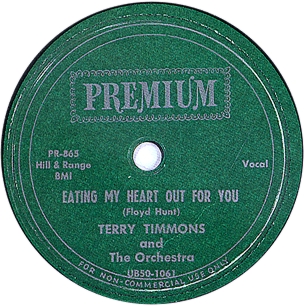
Mickey Carter, who was billed as The Singing Co-Ed in advertisements, also recorded for Premium in September. One of the few white performers to sign with Egalnick and Simpkins, she was accompanied by (probably) four guys who went as the Riff-Tones, played piano, electric guitar, bass, and drums, and contributed some backing vocals. One side of Premium 863, "I Want a Boy Friend for Xmas," appears to have been delivered to the company as a demo, because the matrix number is Pr-101. Its composer credits, to Urbanek and Lucas, may have been to members of the combo, because the tune was published by Premium Music. (Two guitars can be heard on the side, with overdubbing the most likely explanation.) Lew Simpkins took credit for "Underneath the Mistletoe." Miss Carter's single is best described as somewhat dated Swing-influenced pop, with modestly hip contributions from the Riff-Tones. Some today will find Mickey Carter's soprano cute, some will find it whiny; record buyers probably divided along the same lines in 1950.
At an uncertain date, probably toward the end of year, Premium recorded two sides by the Jimmie Bell trio. Bell was a pianist originally out of the boogie-woogie school. Born on August 29, 1910, in Peoria, Illinois, he graduated from high school in St. Louis in 1928, and played professionally in Swing bands for the next 15 years (on occasion, he doubled on trumpet). As a leader in the late 1940s, he was variously based in New York, Detroit, and Chicago, where he made his first recordings for Aristocrat in 1947. Leonard Chess eventually released all four sides from the session (two were held till the label changed its name to Chess) but did not invite Bell and his trio back into the studio.
The Jimmie Bell trio subsequently recorded for the Texas-based Royalty label, then surfaced on Premium; just two titles are known from this session, on which he was accompanied by Walter Scott (electric guitar) and Andrew Harris (bass). The matrix numbers are from the nondescript PR series that Premium threw some of its masters into. At PR-103 and 104 they closely follow the side by Mickey Carter that we think was a demo, and it could be that Bell had them recorded and brought them to the company. (Our thanks to Claude van Rafaelgem for alerting us to this super-scarce release.)
It's unlikely that Bell's Premium 78, hardly ever seen today, achieved much currency. It was has last record. Returning to his hometown, Bell spent the rest of his career playing piano bars. He died in Peoria on December 31, 1987.
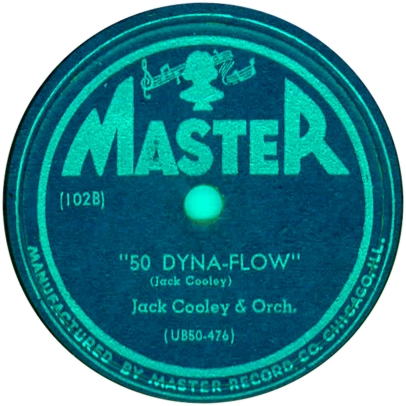
There is a 78-rpm release on Master 102 that we presume is of Miracle / Premium orgin, as the earlier Memphis Slim releases on Master were. It contains two R&B numbers by Jack Cooley and Orchestra. We don't currently know of any other 100 series releases on the Master label. Besides the Master 102 release, which we know from copies in the collections of Tom Kelly and Robert Javors, Tom Kelly and several other collectors have the same two Cooley sides, with the same matrix numbers—on C&G 102. We're listing its session-mate C&G 101 here as well. It turns up less often; did it have a counterpart on Master 101 that turns even less often?
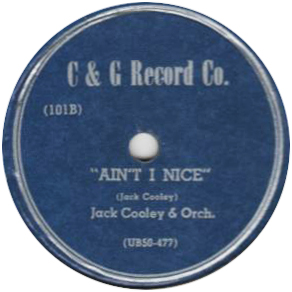
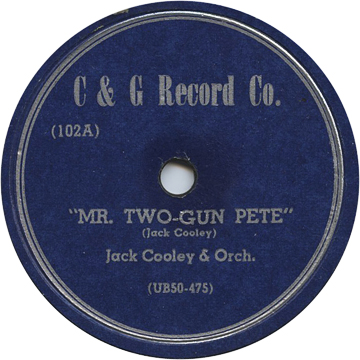
The C&G label shows no street address, but the dark blue label with silver print has the same color scheme as many of the Premium labels. We've included the C&Gs with the Premium releases because of their recording date and the appearance of the C&G label (as well as the ongoing relationship between Lee Egalnick, Lew Simpkins, and Egmont Sonderling). The C&Gs were a private pressing for Cooley; who his business partner was we don't know. The instrumental lineup features the leader's drums (note the rolls that introduce "Dyna-Flow"), along with two tenor saxes (one of whom sounds like his old bandmate Buck Douglas), a trombone, piano, and bass.
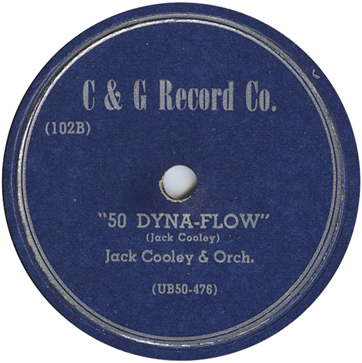
For some 1989 liner notes, writer Bill Dahl interviewed Bob Koester, who recalled that Jack Cooley was popularly known as "Cowboy Jack" because of his preference for cowboy hats. A title like "Mr. Two-Gun Pete," which was a blues about a black policeman in Chicago, certainly goes with the hats. Cooley shows up in the records of Musicians Union Local 208 on September 21, 1944, when his 4-week contract with the Ritz Lounge (35th and South Parkway) was accepted and filed. In February 1945 Cooley was the featured performer at the Subway Lounge (35th and Indiana), and in May he was back playing at the somewhat more upscale Ritz Lounge. In September he was working the Stairway to the Stars. That same year, he made his first records for J. Mayo Williams' hole-in-the-wall operation: "Time to Think" by Jack Cooley and the Cooley Boys was released on Chicago 101 (with a vocal by Ann Sorter McCoy on the flip side), while Ebony 1010 consisted of "Half Way Round the Clock" and "Cooley Rock" by Jack Cooley and His Cooley Boys. A coupling of "Half Way Round the Clock" with another Ann Sorter number ("Bad Stuff") was released in 1946 on 20th Century 20-51; the Philadelphia-based label had struck up a commercial alliance with Williams.
According to Leadbitter and Slaven 1987, Cooley recorded with boogie woogie pianist Albert Ammons on two 1946 sessions for Mercury, playing drums on both of them and singing on one. In October 1946, Cooley was performing at George's Cocktail Lounge (211 East 43rd). The Defender ad also noted that Cooley was "formerly with Louis Jordan, and is presently Recording Artist for Hamptone Recording Co." In December 1946, Cooley was featured at the Hurricane Show Lounge (347 East 55th), and billed as "Jack Cooley and His Swing Quartet." In all the Defender ads relating to these dates Cooley is also billed as "The Man That Plays and Sings The Blues."
In 1947, Cooley handled a vocal and played drums on a session credited to the Israel Crosby Quartette (with Buster Bennett uncredited on soprano sax and another vocal). Two releases on Apollo came out of it. He also cut his own session for Hy-Tone in October 1947; Cooley's release on that label was so obscure that it became known to collectors in August 2018.
It was probably in the Fall of 1948 that Cooley recorded with tenor saxophonist Buck Douglas for the tiny Square Deal operation, of which he was part-owner (thanks to Daniel Gugolz for alerting us to this release).
After completing his C&G session, Cooley could be found at the Hob Nob Lounge and Toad's Pair o' Dice, two establishments with which he inked "indefinite" contracts in August 1950 (they were accepted and filed by Musicians Union Local 208 on August 3). In 1951 or 1952, Cooley recorded two singles for the Nashboro label. Cooley then followed Lew Simpkins over to United and in 1953 cut some sides on the States subsidiary. Cooley would continue to work the Chicago clubs regularly for the remainder of the decade.
Premium's output during 9 months of 1950 was a respectable 59 sides (this was a little more than Aristocrat/Chess recorded that year).
The Premiums from 1950 form an unbroken series from 850 through 868, except we haven't heard of a Premium 864. Premium 869 is also missing (issues on Premium 870 et seq. came out in 1951).
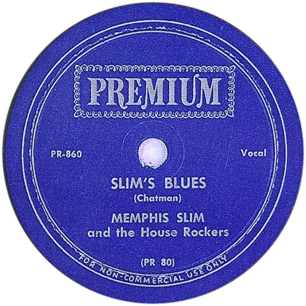
| Matrix | Artist | Title | Release # | Recording date | Release date |
| PR 70 [UB50-37] |
Robert Anderson | He Lives in Me | Premium 859 [Miracle 154] |
1/50 | 1950 |
| PR 71 [UB50-40] |
Robert Anderson | Do You Know Him | Premium 859 (Chess 858) [Miracle 154] |
1/50 | 1950 |
| PR 72 [91138] |
Robert Anderson | King Jesus Will Roll All My Burdens [sic] | Premium 858 [Miracle 147] |
8/49 | 1950 |
| PR 73(F-1009) [91139] |
Robert Anderson | My Friend Jesus [Jesus Is My Friend] |
Premium 858 (Chess 858) (Federal 12004) [Miracle 147] |
8/49 | 1950 |
| UB50-208 | Memphis Slim & The House Rockers | Grass Skirt Boogie | unissued | 3/50 | |
| UB50-209 | Memphis Slim & The House Rockers | (Blues Vocal) | unissued | 3/50 | |
| UB50-210 | Memphis Slim & The House Rockers | Then I'll Be Happy | unissued | 3/50 | |
| UB50-211 | Memphis Slim & The House Rockers | Hello Baby | unissued | 3/50 | |
| UB50-212 | Memphis Slim & The House Rockers | Flock Rocker | Premium 850 [Chess 850?] |
3/50 | 6/1950 |
| UB50-213 | Memphis Slim & The House Rockers | I Guess I'm a Fool | Premium 850 [Chess 850?] |
3/50 | 6/1950 |
| 50-214 | Memphis Slim & The House Rockers | Goodbye Baby | unissued | 3/50 | |
| 50-215 | |||||
| 50-216 | |||||
| UB50-217 | Memphis Slim & The House Rockers | Really Got the Blues | Premium 867 | 3/50 | 1/1951 |
| 50-218 | Memphis Slim & The House Rockers | I Live | unissued | 3/50 | |
| PR 80 [UB50-219] |
Memphis Slim and the House Rockers | Slim's Blues | Premium 860 [Chess 860] |
3/50 | 9/1950 |
| PR 81 [UB50-220] |
Memphis Slim and the House Rockers | Havin' Fun | Premium 860 [Chess 860] |
3/50 | 9/1950 |
| UB50-221 | Memphis Slim & The House Rockers | Mother Earth | Premium 867 | 3/50 | 1/1951 |
| UB50-226 | Lynn Hope Quintet | Song of the Wanderer | Premium 851 [Chess 851] |
3/50 | 6/1950 |
| UB50-227 | Lynn Hope Quintet | Tenderly | Premium 851 [Chess 851] |
3/50 | 6/1950 |
| UB50-228 [U7419] |
Lynn Hope Quintet | Stardust | [Chess 1499] | 3/50 | [1951] |
| UB50-229? [U7420] |
Lynn Hope Quintet | More Bounce to the Ounce | [Chess 1499] | 3/50 | [1951] |
| UB 50-264-2 | Miff Mole | Light as a Feather | Premium 853 | 3/17/50 | 6/1950 |
| UB50-265 | Miff Mole | Vocal Booker Washington | Saint's [sic] Go Marching In | Premium 852 | 3/17/50 | 6/1950 |
| UB 50-266-2 | Miff Mole | High Society | Premium 853 | 3/17/50 | 6/1950 |
| UB50-267 | Miff Mole | Running Wild | Premium 852 | 3/17/50 | 6/1950 |
| UB50-474 | Jack Cooley & Orch. | This Is It | C&G 101A | c. 4/50 | 1950 |
| UB50-475 | Jack Cooley & Orch. | Mr. Two-Gun Pete | Master 102A C&G 102A |
c. 4/50 | 1950 |
| UB50-476 | Jack Cooley & Orch. | 50 Dyna-Flow | Master 102B C&G 102B |
c. 4/50 | 1950 |
| UB50-477 | Jack Cooley & Orch. | Ain't I Nice | C&G 101B | c. 4/50 | 1950 |
| 50-500 | Memphis Slim & The House Rockers | Messed Up | unissued | c. 5/50 | |
| 50-501 | Memphis Slim & The House Rockers | I'm in Heaven | unissued | c. 5/50 | |
| UB50-604 | The Holy Wonders | It Won't Be Long | Premium 854 | 6/50 | 1950 |
| UB50-605 | The Holy Wonders | Move in the Room with the Lord | Premium 854 | 6/50 | 1950 |
| UB50-606 | Robert Anderson | Holding My Savior's Hand (Version I) | Premium 855 | 6/50 | 6/1950 |
| UB50-606A | Robert Anderson | Holding My Savior's Hand (Version II) | Premium 855 | 6/50 | 1950 |
| UB50-607[tk. 2] | Robert Anderson | Prayer Changes Things | Premium 868 | 6/50 | 1951 |
| UB50-690 | Sarah McLawler accompanied by Chorus and Orchestra | My Whole Life Through | Premium 857 | c. 6/50 | 11/1950 |
| UB50-691 | Eddie Chamblee? | Every Shut Eye Ain't Sleep | unissued | c. 6/50 | |
| UB50-692 | Sarah McLawler? | It's the Truth | unissued | c. 6/50 | |
| Eddie Chamblee | And the Angels Sing | unissued | c. 7/50 | ||
| Eddie Chamblee | Easy Street | unissued | c. 7/50 | ||
| UB50-706 | Eddie Chamblee and his Orchestra | Sweet Lucy | Premium 856 | c. 7/50 | 8/1950 |
| UB50-707 | Eddie Chamblee and his Orchestra (vocal: Danny Overbea) | Every Shut Eye Ain't Sleep | Premium 856 | c. 7/50 | 8/1950 |
| UB50-708 UB50-709a in vinyl |
Sarah McLawler accompanied by Orchestra | It's The Truth, So Help Me | Premium 857 | c. 7/50 | 11/1950 |
| UB50-709 | Sarah McLawler | It's The Truth | unissued | c. 7/50 | |
| UB50-710 | Sarah McLawler | My Whole Life Through | unissued | c. 7/50 | |
| UB50-824 | Lynn Hope Quintet | Mona Lisa | Premium 862 | c. 8/50 | 12/1950 |
| UB50-825 | Lynn Hope Quintet | Poinciana | Premium 861 [Chess 861] |
c. 8/50 | 12/1950 |
| UB50-826 | Lynn Hope Quintet | She's Funny That Way | Premium 861 [Chess 861] |
c. 8/50 | 12/1950 |
| UB50-827 | Lynn Hope Quintet | Bonga Boogie | Premium 862 | c. 8/50 | 12/1950 |
| Pr-101 | Mickey Carter and the Riff-Tones | I Want a Boy Friend for Xmas | Premium 863 | 1950 | 12/1950 |
| UB50-972 | Mickey Carter | Lucky Break | unissued | c. 9/50 | |
| UB50-973 | Mickey Carter and the Riff-Tones | Underneath the Mistletoe | Premium 863 | c. 9/50 | 12/1950 |
| UB50-974 | Mickey Carter | Lonely Hours | unissued | c. 9/50 | |
| ? | Mickey Carter | The Web | unissued | c. 9/50 | |
| UB50-1062 | Rhythm Willie, His Harmonica and Orchestra | Wailin' Willie | Premium 866 | c. 9/50 | 12/1950 |
| UB50-1063 | Rhythm Willie, His Harmonica and Orchestra | I've Got Rhythm | Premium 866 | c. 9/50 | 12/1950 |
| UB50-1061 | Terry Timmons and the Orchestra [Terry Timmons and Orchestra] |
Eating My Heart Out for You | Premium 865 [RCA Victor 20-4229] |
c. 9/50 | 12/1950 (8/1951) |
| UB50-1062 [sic] | [Terry Timmons and Orchestra] | Worried Woman Blues | [RCA Victor 20-4229] | c. 9/50 | (8/1951) |
| UB50-1063 [sic] | Terry Timmons and the Orchestra | It Ain't Supposed to Be like That | [RCA Victor 20-4228] | c. 9/50 | (early 9/1951) |
| UB50-1064 | Terry Timmons and the Orchestra | Your Key Won't Fit My Door | Premium 865 | c. 9/50 | 12/1950 |
| UB50-1065 [UB50-38] |
Robert Anderson | God Answers Prayers | Premium 868 | 1/50 | late 1950 |
| PR-104 | Jimmie Bell Trio | Boy Doy | Premium 870 | prob. late 1950 | prob. early 1951 |
| PR-103 | Jimmy Bell Trio | Stranger in Town | Premium 870 | prob. late 1950 | prob. early 1951 |
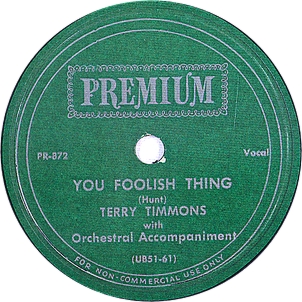
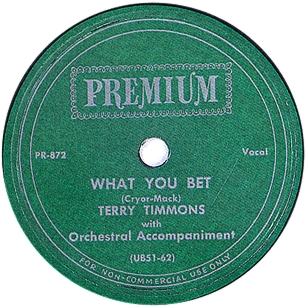
Premium kicked off 1951 with a session on January 12, split between Terry Timmons and singer Cryin' Jesse. The orchestra behind Jesse Cryor, to use his real name, consisted of alto, tenor, and baritone saxes, piano, guitar, bass, and drums, and sounds as though it had backed a bunch of shows. "Feel Goody Goody" has a brief baritone sax solo in the Leo Parker manner. "And She Cried" is a countrified pseudo-gospel number with comic vocal impressions by Jesse. Meanwhile, Cryor penned one of the songs that Terry Timmons sang. On the Timmons sides, the baritonist switched to alto sax, making for another lush, sentimental arrangement on the ballad, "You Foolish Thing." "What You Bet" is a Swing number delivered with aplomb by the singer, who we wish had been given more material like this. The number features a strong lead from one of the alto saxes and tenor sax solo delivered in a rough tone. Reissuers have been missing a bet here...
Premium 872, by Terry Timmons, was out in March. A company ad wishfully proclaimed it "the best coin-catcher of the year" (Billboard, March 17, 1951, p. 137).
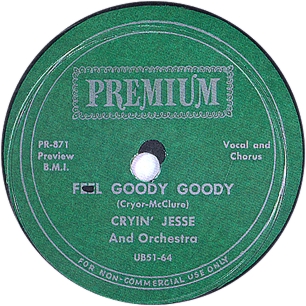
Veteran singer Jesse Olden Cryor was born in Baltimore, Maryland, on August 12, 1906, the oldest of seven children. He was blinded in one eye after being hit by a streetcar, and had to quit school in ninth grade to help support his family. He began singing and telling jokes in local speakeasies, and entered the black vaudeville circuit in 1927, joining the Drake and Walker revue in his native Baltimore. He worked solo in New York for a while, then went with the Will Mastin Trio, later joining pianist Bob Williams in the Williams and Cryor act (1930-33). He returned to solo work in the late 1930s, and at one time led his own band, Jesse Cryor and the Ramblin’ Rascals. In 1940, he married Laverne Wesley, a showgirl whom he met in Los Angeles. During 1942-43 he was vocalist for Noble Sissle's big band. After leaving Sissle, Cryor settled in Los Angeles where he started a family, and worked up and down the West Coast. In 1946, he made two records in LA for the G&G label, and recorded a session with the Irving Ashby band, sharing vocal duties with Edith Wilson, for the Enterprise label. Cryor was the uncredited singing voice of Brer Rabbit in the Disney film, Song of the South (1946). Work dried up in Los Angeles in the late 1940s and in 1950 Cryor moved to Chicago. The following year Premium waxed him. In 1952 Cryor left show business and got a job as a waiter in the Palmer House Hotel, where he remained until his retirement in the early 1980s. One of his songs, "You've Got Me Wrong," was used on bluesman Billy Boy Arnold's October 1955 session for Vee-Jay.
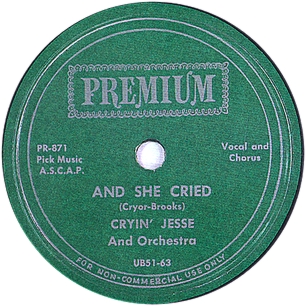
Cryor suffered a stroke in 1995. On January 11, 2006, Jesse Cryor died at South Suburban Hospital in Hazel Crest, Illinois, from congestive heart failure and kidney failure. He was 99, and is thought to have been one of the last black vaudevillians. He was survived by his two daughters, 7 grandchildren, 10 great-grandchildren, and 1 great-great grandchild. Our potted biography is based on the much longer unpublished account, "Jesse Cryor" (June, 2001), written by his daughter Phyllis M. Johnson, and on his obituary in the Chicago Sun-Times (January 19, 2006).
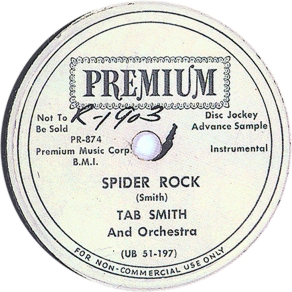
In March of 1951, Premium added to its roster the marvelous alto saxophonist Talmadge "Tab" Smith, born in Kinston, North Carolina, on January 11, 1909. The signing was announced in an ad in Billboard(March 24, 1951, p. 37). His first single, the ad said, was to be released on March 25. He would get two on Premium, however, and we don't know whether this was Premium 874 or 876. Besides, we aren't sure that his session for the label, at United Broadcasting, had taken place yet. Premium 874, which the object of some speical promotions, circulated as a white-label DJ copy as well as with the regular green label; we don't know of any other Premiums that got such treatment.
"The inimitable" Tab Smith, as he was billed in the ad, brought a lot of experience to the label, having played since the mid-1920s in the Carolina Stompers, Eddie Johnson's Crackerjacks, and the Mills Blue Rhythm Band, and under such leaders as Teddy Wilson, Count Basie, and Lucky Millinder. After a long stay as leader of the house band at Harlem's Savoy Ballroom in the late 1940s, which led to recordings for many small labels in the New York area, Smith moved back to St. Louis in 1950. There deejay Spider Burke caught him in a club and recommended him to Lew Simpkins as a good act to record. When Tab Smith laid down his Premium tracks, four of which saw release in May, he named one of them "Spider Rock" in gratitude to the disc jockey.
Smith used a strong band consisting of Sonny Cohn (trumpet), Leon Washington (tenor sax), "Pete Johnson No. 2" (piano); Wilfred Middlebrooks (bass) and the legendary Walter Johnson (drums). At the time, Smith's working band was a quartet; for recording purposes, he borrowed Sonny Cohn and Leon Washingon from the Red Saunders band.

Tab Smith would enjoy considerable commercial success after he moved to United, beginning his recording activities for them with virtually the same combo. "Because of You" was a big hit in 1951, and he stayed with the United operation over its entire life cycle, cutting 85 sides in 6 years, getting an LP, and appearing on the very last single that the company released. After an unsuccesful stint at Checker/Argo in 1958 and 1959 and a final recording session for King in 1960, he sold real estate in Saint Louis and played piano in a steakhouse. In the early 1960s, he cut one last single for a small local label called ELJ, run by the same Eddie Johnson whose band he had played in during his youth. Tab Smith died in Saint Louis on August 17, 1971.
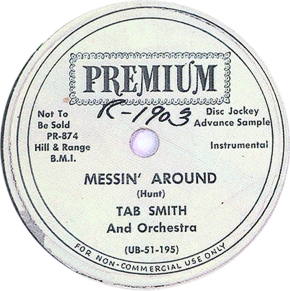
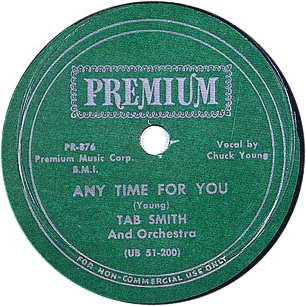
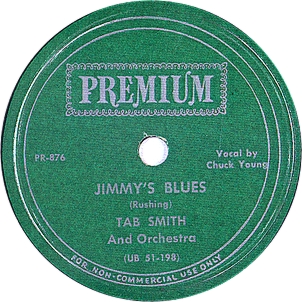
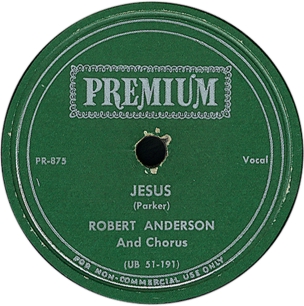
Premium recorded one last session on Robert Anderson in April, releasing at least two sides, "Jesus" paired with "God Spoke to Me." Around this time, it appears, Anderson decided it would be best that he sang as part of a group, and formed an all-female backup ensemble, the Caravans. "Jesus" (it's mislabeled in some discographies as "Jesus Is My Friend," though it never uses those words) is a powerful uptempo number that features call and response between the Reverend and the Caravans, with organ accompaniment. Depsite the reference to his "chorus" on the the label, the somewhat lugubrious "God Spoke to Me" is strictly Anderson's vehicle, with piano and organ in the background. The Caravans would go on to fame as one of the all-time great gospel groups, but only after Anderson and the Caravans signed with United at the end of 1951. Anderson got a one-year contract with United, while the Caravans subsequently struck out on their own after their second session with him, becoming a mainstay of that company's States subsidiary.
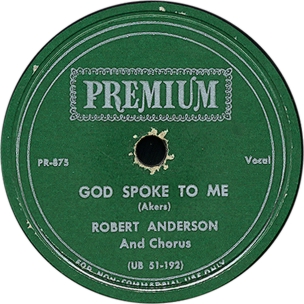
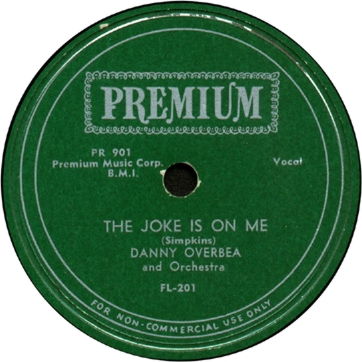
At an unspecified date in early 1951 Premium did some recording in Cleveland, which is the apparent source of all Premium recordings with the FL prefix. Danny Overbea got the opportunity to record some tracks under his own name, "The Joke Is on Me" and "Contrary Mary." Overbea remembered Egalnick thusly: "He wrote me a rubber check, but that's another thing. He weighed about 400 pounds. He was a big guy." Most likely, Egalnick was recording in Cleveland because his credit was not longer good at United Broadcasting Studios... Danny Overbea subsequently recorded for Al Benson and Leonard Chess and enjoyed moderate success with such numbers as "Train, Train, Train" and "40 Cups of Coffee" (see the King Kolax and Chess discographies for these). As time went on, however, Overbea recorded more pop material and his sales declined. In the late 1950s he was no longer making hit records but was steadily employed on the Chicago club scene. Danny Overbea died on May 11, 1994.
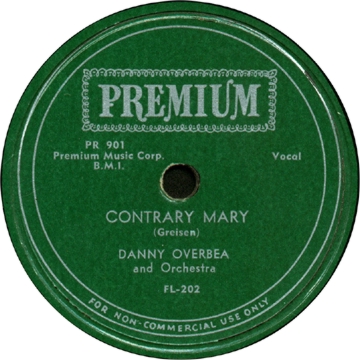
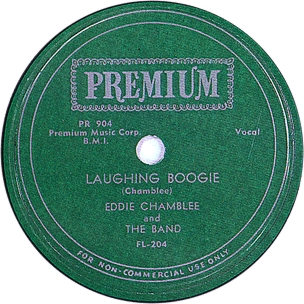
Almost certainly at the same session, Eddie Chamblee cut at least two more sides for Premium. This version of the band consisted of Chamblee, John M. Young (piano), and probably Ernie Shepard (bass) and Osie Johnson (drums) to round out the rhythm section; with the addition of guitarist Walter Scott, this would be Chamblee's regular band through 1953. The prominent guitar work sounds like Overbea's instrumental contribution.
Eddie Chamblee continued to lead his own combo (with some changes of personnel) into 1955. From 1952 through 1954 he recorded as sideman and leader for United; in 1955, he also did session work for the boutique label Club 51 and, occasionally, for Chess. He rejoined Lionel Hampton in 1955-1956 and then worked with Dinah Washington (to whom he was briefly and not very happily married) through 1958. While with Dinah, he relocated to New York City. After a long performing and recording career, Eddie Chamblee died in New York on May 1, 1999.
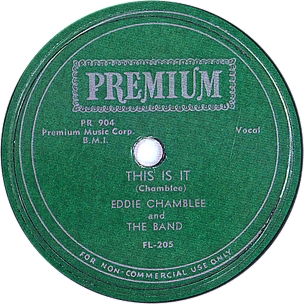
At some point in 1951 Premium recorded the famous nomadic bebopper Sonny Stitt (1924-1982). On these items, Stitt played tenor sax and was backed by piano, bass, and drums. Contrary to existing reports, his rhythm section was probably not Junior Mance (piano), Gene Wright (bass), and Teddy Stewart (drums), and the date was almost certainly not May 3. Ruppli's Chess Discography, followed later by Lord and others, made the incorrect inference that Sonny Stitt recorded at the same May 3, 1951 session that produced four Gene Ammons sides (matrix numbers U7337 through U7340) for Chess; Jug used Mance, Wright, and Stewart on his session. Premium sowed tremendous confusion among discographers because it never got around to releasing anything from the session; Chess later shoved two of the Stitt sides into a gap in the Chess matrix number series at U7335 and 7336. Walter Bruyninckx' jazz discography cites two sides, "I Cover the Waterfront" and "Don't Worry 'bout Me" as having been recorded in Chicago, "c. 1951." Before Bruyninckx, Jørgen Grunnet Jepsen mistakenly grouped these (and two other sides that were actually by Gene Ammons and/or Tom Archia) with material that Stitt recorded in Chicago for Chess in 1957-1958.
What really happened is that Stitt recorded 4 sides for Premium that were promptly sold to the Chess brothers when the label went belly-up; the Chess brothers took possession of this material in December 1951. Two sides were given numbers in the U7000 series used by Chess; their original matrix numbers remain unknown. Despite the U series matrix numbers indicating a 1951 recording, and likely release plans shortly after they were acquired, "Waterfront" and "Worry" were never used until Chess included them in an album of Gene Ammons and Sonny Stitt material in 1960. We still do not know anything about the other two titles.
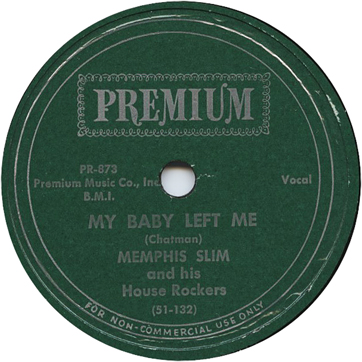
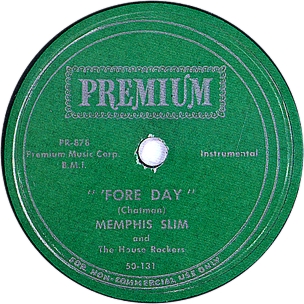
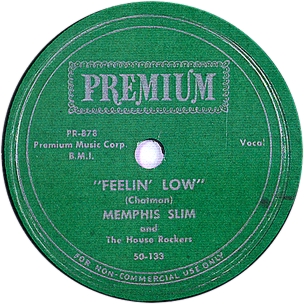
Meanwhile, Premium kept up with another old reliable, Memphis Slim. Although many sources say that his February 1951 session kept the House Rockers' front line of Alex Atkins and Timothy Overton on alto and tenor sax, but in fact there were now two tenors in the group, probably Overton and someone else. Rounding out the combo, Ike Perkins was now on guitar, Alfred Elkins on bass, and Oscar Larkin on drums. Slim's final session, cut in Cleveland, featured a brand-new lineup of Neal Green and Charles Ferguson on tenor sax, Henry Taylor on bass, and Otho Allen on drums. Slim would keep this two-tenor front line for several years. "I'm Crying" is a unison duet between Slim and Terry Timmons, reportedly his girlfriend at the time. Unfortunately their vocal styles didn't match up well; Slim's decision to sing high and soft was ill-advised. The number does feature a nice improvised duet between the tenor players. "Tia Juana" is strictly a vehicle for Slim, and a musically successful one; during his group's many tours he must have been spending time in New Orleans, for his piano work shows the influence of Fats Domino and Professor Longhair.
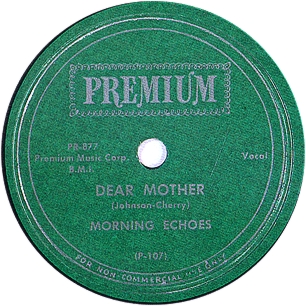
The company also tried a new gospel quartet, the Morning Echoes. We know nothing further about these Echoes, who left just their two released sides; did they have any connection with a Detroit-based group by the same name that recorded in the 1960s? None of the artists still on the roster could do enough to keep the new company afloat.
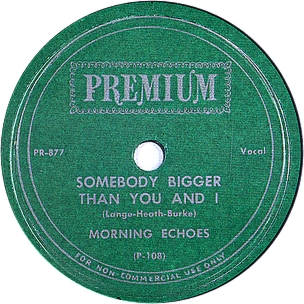
In 1951, Premium managed to record 35 sides. By the end of its run of slightly over a year, the label was in the same straits that Miracle had been in; it could no longer record at United Broadcasting Studios.
| Matrix | Artist | Title | Release # | Recording date | Release date |
| UB51-61 | Terry Timmons with Orch Acc. | You Foolish Thing | Premium 872 (RCA Victor 20-4228) |
1/12/51 | 3/1951 (early 9/1951) |
| UB51-62 | Terry Timmons with Orch Acc. | What You Bet | Premium 872 | 1/12/51 | 3/1951 |
| UB51-63 | Cryin' Jesse [Jesse Cryor] and Orchestra | And She Cried | Premium 871 | 1/12/51 | 4/1951 |
| UB51-64a | Cryin' Jesse [Jesse Cryor] and Orchestra | Feel Goody Goody | Premium 871 | 1/12/51 | 4/1951 |
| UB51-130 | Memphis Slim and His House Rockers | Trouble, Trouble | Premium 873 | 2/51 | 4/1951 |
| UB51-131 [50-133 on label] |
Memphis Slim & The House Rockers | 'Fore Day | Premium 878 | 2/51 | 5/1951 |
| UB51-132 | Memphis Slim and His House Rockers | My Baby Left Me | Premium 873 | 2/51 | 4/1951 |
| UB51-133 [50-131 on label] |
Memphis Slim & The House Rockers | Feelin' Low | Premium 878 | 2/51 | 5/1951 |
| UB 51-191 | Robert Anderson and Chorus | Jesus | Premium 875 | 4/51 | 5/1951 |
| UB 51-192 (UB 51-192-B in the vinyl) |
Robert Anderson and Chorus [sic] | God Spoke to Me | Premium 875 | 4/51 | 5/1951 |
| 51-193 | |||||
| 51-194 | |||||
| UB51-195 | Tab Smith and Orchestra | Messin' Around | Premium 874 | 4/51 | 5/1951 |
| WB-51-196 [sic] [U-7421] |
Tab Smith and His Orchestra | Love | [Chess 1501] | 4/51 | |
| UB51-197 | Tab Smith and Orchestra | Spider Rock | Premium 874 | 4/51 | 5/1951 |
| UB 51-198 [18790] |
Tab Smith and Orchestra (Vocal by Chuck Young) | Jimmy's Blues | Premium 876 | 4/51 | 5/1951 |
| UB 51-198 [alt.] [18803] |
Tab Smith and Orchestra (Vocal by Chuck Young) | Jimmy's Blues | (Chess CHV 412) | 4/51 | |
| UB51-199? [U7422] |
Tab Smith and HIs Orchestra | Easy, Mr. Benson | [Chess 1501] | 4/51 | |
| UB 51-200 | Tab Smith and Orchestra (Vocal by Chuck Young) | Any Time for You | Premium 876 | 4/51 | 5/1951 |
| P 107-C | Morning Echoes | Dear Mother | Premium 877 | 5/51 | 5/1951 |
| P 108 C | The Morning Echoes | Somebody Bigger than You and I | Premium 877 | 5/51 | 5/1951 |
| Sonny Stitt | ? | 1951 | |||
| [U7335] | Sonny Stitt | I Cover the Waterfront | (Chess LP 1445) | 1951 | |
| [U7336] | Sonny Stitt | Don't Worry 'bout Me | (Chess LP 1445) | 1951 | |
| Sonny Stitt | ? | 1951 | |||
| FL-201 | Danny Overbea and Orchestra | The Joke Is on Me | Premium 901 | early 1951 | early 1951 |
| FL-202 | Danny Overbea and Orchestra | Contrary Mary | Premium 901 | early 1951 | early 1951 |
| FL-204 | Eddie Chamblee and The Band | Laughing Boogie | Premium 904 | 1951 | prob. 7/1951 |
| FL-205 | Eddie Chamblee and The Band | This Is It | Premium 904 | 1951 | prob. 7/1951 |
| FL-208? | Memphis Slim | Marack | (Chess LP 1455) | 1951 | |
| FL-209? | Memphis Slim | Reverend Bounce | [Chess 840?, Chess LP 1455] | 1951 | |
| FL-210 | Memphis Slim and the House Rockers | Tia Juana | Premium 903 [Chess 903] |
1951 | 7/1951 |
| FL-211? [U-7395] |
Memphis Slim and His House Rockers | Walking Alone | [Chess 1491] | 1951 | |
| FL-212? [U-7396] | Memphis Slim and His House Rockers | Rocking the Pad | [Chess 1491] | 1951 | |
| FL-213 | Memphis Slim and Terry Timmons with Orchestra Memphis Slim and Terry Timmons |
I'm Crying | Premium 903 [Chess 903] |
1951 | 7/1951 |
Premium was responsible for 29 known releases: 850-863, 865-868, 870-878, 901, 903, and 904. Two of these (858 and 859) were straight reissues of Miracle singles; 868 reissued one side of a Miracle single with a new coupling. There was one Premium-related release on Master 102.
As Premium faltered in the summer of 1951, Lew Simpkins went to an old tailor friend of his, Leonard Allen, and together (with Allen's seed money) they founded United Records, which opened with a recording session on July 12. The United operation and its States subsidiary would sign a passel of Miracle and Premium artists: Memphis Slim, Tommy Dean, Terry Timmons, Browley Guy, Tab Smith, Robert Anderson and his Gospel Caravan, Eddie Chamblee, Jack Cooley. After a session for Coral in 1952, Eddie Chamblee recorded several items, both vocal and instrumental, for the new company (2 singles resulted) and accompanied the Four Blazes on three hit records. Chamblee left Chicago in 1958 and settled in New York, where he continued to work for many years (he died in 1999). Tab Smith had a huge R&B hit in "Because of You" and become the commercial mainstay at United, recording prolifically until Leonard Allen closed his labels in 1957; after 1960 he sold real estate and was largely retired from music until his death in 1971. Robert Anderson's popularity began to decline after his female back-up quartet, The Caravans, were successful with two sides that they recorded at the end of a session for States label in 1952; they went out on their own and Anderson's later groups fell out of favor with the gospel audience. Anderson then recorded for Specialty and for Apollo. After some years out of music, Anderson recorded again in the 1980s for Spirit Feel. Anderson died in Chicago in June 14, 1995.

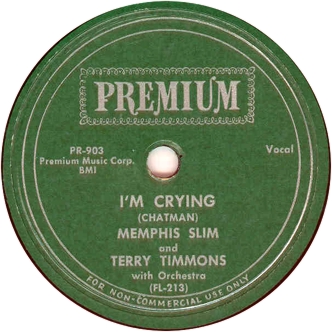
Meanwhile, Lee Egalnick soldiered on. In July, he made a brief attempt to re-enter the distribution business, moving Premium and Gotham product in the Chicago area (Cash Box, July 7, 1951, p. 7). That same month, he sold Terry Timmons' contract to RCA Victor along with six of her masters. RCA didn't hesitate: it turned four of them into two singles, which it brought to the shelves in late August and early September. RCA Victor 20-4229, "Worried Woman Blues" b/w "Eating My Heart out for You" drew a review in Cash Box on August 25, 1951 (p. 14). (We'd previously thought 20-4229 was released in November). RCA Victor 20-4228, "You Foolish Thing" b/w "Ain't Supposed to Be like That," was out a week later (Cash Box, September 1, 1951, p. 18).
Egalnick also announced the release of Timmons' last appearance on Premium, "I'm Crying," which she performed as a duet with Memphis Slim; the other side, "Tia Juana," was a vocal feature for Slim. Display ads for Premium 903 ran in Cash Box on July 21 (p. 25) and 28 (p. 15). Despite garnering some regional sales around Dallas, Texas, as late as September 1 (according to "Hot in" lists in Cash Box), Premium 903 was the label's last gasp. Without Lew Simpkins, one wonders how many employees Egalnick still had, and one wonders what he could offer to distributors and juke box operators besides Premium 903. He was so desperate to stay in the business that on September 8 Cash Box (p. 7) mentioned a trip to New York City to promote his house music publishing company (his "pubbery," as the trades liked to put it in those days). Setting up a house publisher for Premium put Egalnick ahead of some of his competitors, including Leonard and Phil Chess.
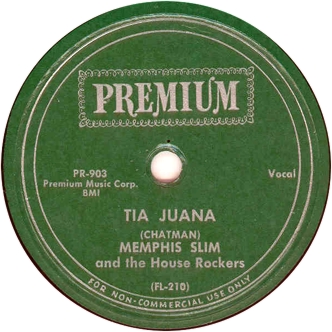
Memphis Slim went on to record three sessions for Mercury in the second half of the year: a total of 8 cuts, which included Terry Timmons on three. While on the road, he cut a second session for Peacock (enough to fill an LP, but only two sides were released) before rejoining Lew Simpkins on the United roster in the Fall of 1952. Timmons remained with RCA till July 1953, when her contract expired; her last release, drawn from a session cut in Detroit, appeared on United 161 in October 1953. She made a final session for United in Chicago in November 1953. It has been claimed that nothing was released because her then-boyfriend Al Smith stank it up with poor bass playing, but when the sides were finally issued in 2004 on a Delmark CD they were more than passable. (For a capsule history, see Midwestern Memories: Terry Timmons by J. C. Marion.)
Desperate exertions notwithstanding, Premium was dead by the end of October 1951. In December of that year, the trade papers announced that Chess had purchased 40 Premium masters on Sarah McLawler (6), Eddie Chamblee (6), Tab Smith (4), Memphis Slim (12), Robert Anderson (8), and Sonny Stitt (4). Chess picked the masters up from one Mr. Stone, who held a chattel mortgage on them.
It turns out that there was more to the package; the old Chess master book (copies provided by Bill Daniels) shows that the label acquired four tunes by Memphis Slim that we had previously not been aware of (UB50-208 through UB50-211); all 6 Premium masters recorded by Mickey Carter, who was billed as the Singing Co-Ed; the Lynn Hope material; the Miff Mole sides—even the two by Cryin' Jesse. In fact most of Premium's total output of 92 sides ended up in the possession of the Chess brothers. They have been handed down through successor labels; the remaining masters now repose in the vaults at Universal.

Chess made variable use of this Premium material. Chess promptly reissued Premium 851, by the Lynn Hope Quintet, as Chess 851, on both 78 and 45 rpm, with the original matrix numbers (though in the vinyl of Chess 45-851, these have been distorted into 5026 and 5027; thanks to Tom Kelly for information on the 851 reissues). Chess 858 executes a straddle, coupling one side of Robert Anderson's Premium 859 with one side of his Premium 858. Chess 855 and 868 by Anderson (in this case, a straight relabelings of Premium 855 and 868) have also turned up. Robert Javors has found a straight reissue of Lynn Hope's Premium 861 on Chess 861. Some, though not all, of these 78s were generated the easy way, by slapping Chess labels onto unsold Premium pressings.
Bill Daniels reports that "Flock Rocker" by Memphis Slim appeared on a Chess 840—but its Premium release was 850. Was there another relabel job, then—a Chess 850? More data would be helpful here. Tony Berci has reported a straight reissue of Slim's Premium 860 as Chess 860. There is even a Chess 903 by Memphis Slim (unusually rare, as such things go).
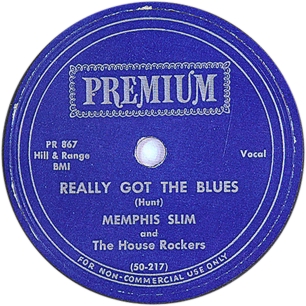
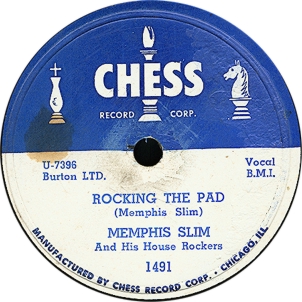
In January 1952 Chess put out two of Memphis Slim's sides from his last Premium session (the mates to the two sides on Chess 903) on Chess 1491. The sales figures, whatever they were, did not stimulate further trips into the archives. In 1959, two of Slim's Premiums appeared on a Chess blues anthology LP. In 1961, Slim (now an internationally renowned figure, about to settle in Paris) got a full LP of his own, again consisting of Premium material. A different assortment came out on a Chess LP in 1966. "Mother Earth," which has come to be regarded as a classic, once again appeared on a Chess blues anthology in 1992 and is Slim's only contribution to the 15-CD Chess label retrospective that was issued in 1999.
Chess followed up on Chess 851 in March 1952 with another Lynn Hope single that had not come out on Premium. We have yet to find evidence that the Chess brothers did anything with the Eddie Chamblee and Sarah McLawler sides, let alone Cryin' Jesse and Mickey Carter. Two of the Tab Smith sides, one of them opportunely dedicated in one edition to DJ Al Benson, came out on a Chess single in 1952, but the rest sat around for years. Sadly, when two takes of "Jimmy's Blues" appeared on a Chess Vintage Series LP in 1972, there was so little surviving documentation that the one-time hitmaker was listed as an "unknown artist." Two of the Stitt items were apparently prepared for release (around the end of 1951, when Chess put out the Lynn Hope material). But they did not actually appear until 1960 on Chess LP 1445 (after which they were reused on several other LPs).
The Miff Mole session resurfaced in late 1956 on Argo LP-606, Doorway to Dixie (our thanks to Bob Koester for this information). Argo had valve trombonist and bass trumpeter Cy Touff record enough new material to fill out a 12-inch LP release.
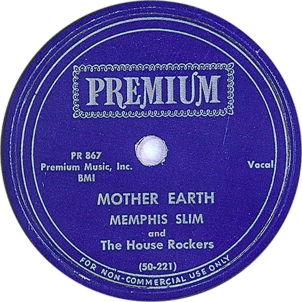
While the Chess brothers sifted through the remains of his second record label, Lee Egalnick continued in the music business managing his Premium Music Publishing Co. He was now a song plugger.
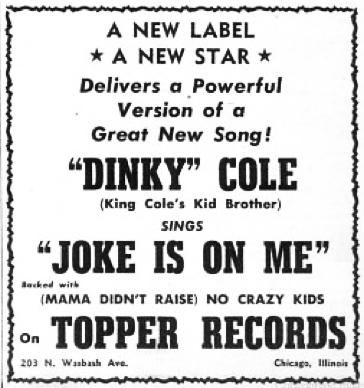
The next year he tried one last time to get back into recording. Sam Evans reported in Cash Box ("Kickin' the Blues Around," July 5, 1952, p. 13) that there was "Talk on the street" Egalnick might team up with Chicago distributor Milt Salstone to start a new R&B label.
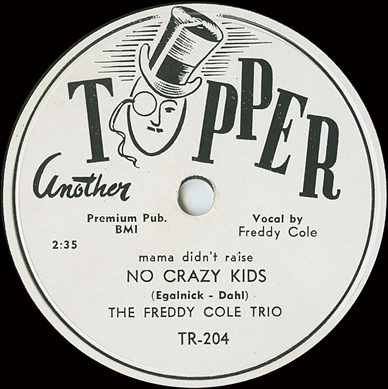
This didn't happen. Instead, Egalnick briefly attached himself to a start-up called Topper, which had opened at the end of May 1952, and released two singles (Topper 200 by Johnny Holiday; Topper 202 by Chet Roble) in June. Topper's owners were Rick Noran and Jack DeSort. Topper 202 included "Barefoot Boy" by LaVere and Holiday; it was published by Premium. In September, Topper came out with a single by Nat King Cole's brother, Freddy Cole, performing in a familiar manner with a familiar piano-guitar-bass lineup.
Topper 204 was advertised in Billboard on September 13. As noted in Cash Box on September 17 (p. 17), one side, "(Mama Didn't Raise) No Crazy Kids," was co-written by Egalnick; the flip was another rendition of the Lew Simpkins tune, "The Joke Is on Me," which was written for Danny Overbea's last Premium session. But 204 was a final throe. Topper would put out no more records.Two months later, Sam Evans had forgotten all about Freddy Cole's record, and about anything else on Topper. He ran an item from Cole's agent, stating that Cole was about to disband his trio to work as a single, and "Several diskeries are showing interest in pacting Freddy" (Cash Box, November 8, 1952, p. 21). In coming years, a couple of other independent labels would show an interest Freddy Cole. In 1957, Cole cut a single in New York City for the Winley label, run by Paul Winley ("Cole [Not Nat]," Cash Box, November 16, 1957, p. 48). The trades would not again mention Lee Egalnick.
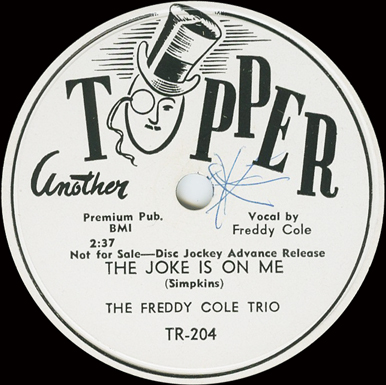
Lee and Francine Egalnick were in Chicago for another year after Topper closed. Pretty soon after that, they moved to Texas. Did memories of the final sales on Premium 903 lure them to the Lone Star State? By 1957, Lee Egalnick and his family were living in West University Place, Texas, one of the suburbs that Houston had subsequently marched past and surrounded (Francine was said to be "of Houston, Tx." in her mother's obituary, "Sadye Fisher," Chicago Tribune, July 23, 1957, pt. 2, p. 28). Lee's son Robert recalled riding his bicycle from West University to the Channel 13 TV studio (in downtown Houston) when he was 10. Charles Egalnick was in Dallas, and his father and mother eventually moved there as well. When Sam Egalnick died in September 1964, Lee's younger sister, Mrs. Margaret Trubitt, was residing in Dallas. What kind of work Lee Egalnick did when he first arrived in Houston we don't know, but after a while he established himself in the foundry (metal molding and casting) business. In 1970, he was the president of the Texas Foundrymen's Association. He later ran such companies as the Texas Reduction Corporation, which in 1976 built an aluminum recycling plant in Manvel, Texas.
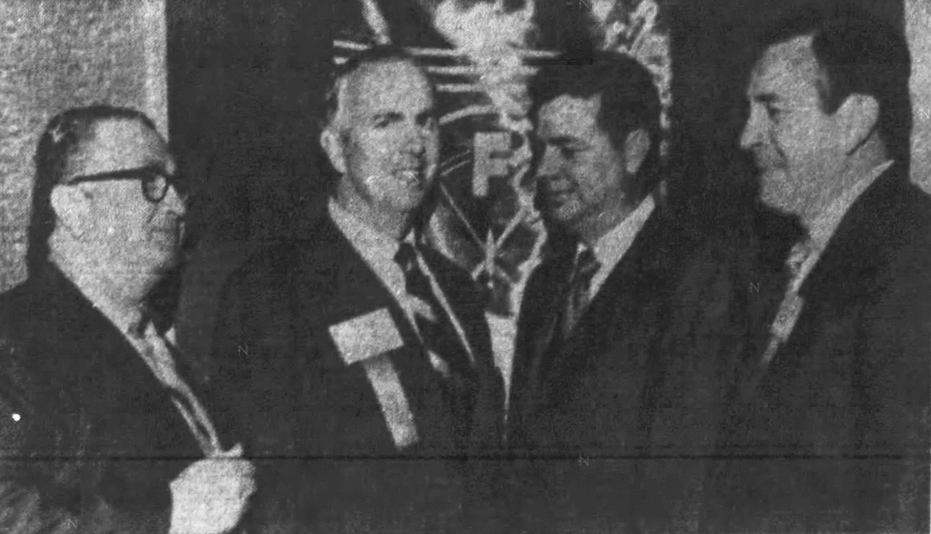
His son Kenneth played baseball at Blinn College, and Egalnick started a summer baseball league to help high school and college players develop their talent. The Karl Young League (named after an early benefactor) was rather successful. In the fullness of time, it would bring Egalnick more publicity than anything he'd done since he exited the music business. In 1986, Egalnick got the opportunity to brag on some alumni of the program who were playing in the major leagues, including Boston Red Sox rookie pitcher Roger Clemens. In 1988, Egalnick incorporated the Karl Young College League (he had probably retired from or sold his other businesses), and ran it until his death. Celia Egalnick died in Dallas, Texas, in October 1986. Francine Egalnick died in Houston, Texas, on June 12, 1995. Lee L. Egalnick died in Houston on January 8, 2000, at the age of 78. Charles Egalnick died September 29, 2010, in Dallas. Margaret Egalnick Trubitt, who had been an elementary school teacher for 25 years in the Dallas Independent School District, died in Dallas on November 10, 2011 (Dallas Morning News, November 12, 2011).
Lee and Francine's son Robert Alan Egalnick, known profesionally as Bob Allen, was a locally renowned sportscaster. After graduating from Westbury High School and Stepen F. Austin State University, he joined KTRK (Channel 13) in 1974 and spent 38 years there, leaving at the beginning of 2013. From mid-2013 to 2015, he worked at KHOU (Channel 11), retiring when he was diagnosed with cancer. Bob Allen died on October 20, 2016 ("Longtime Houston TV sports anchor Bob Allen has died at 70," Houston Chronicle, October 20, 2016, https://www.chron.com/sports/article/Longtime-Houston-TV-sports-anchor-Bob-Allen-has-9985516.php#photo-15589595. (See the memorial tributes at https://www.khou.com/article/news/local/friends-family-say-goodbye-to-bob-allen-at-private-service/341671711 and https://www.dignitymemorial.com/obituaries/houston-tx/bob-allen-7136021). Ken Egalnick went into the insurance business and now lives in Sugar Land, Texas.
Premium is a fairly obvious name for a record label. A few years after Lee Egalnick closed his company, a new Premium sprang up in New Jersey. It was run out of Linden, a town previously associated with DeLuxe and Regal, by Joseph Leibowitz, who had been the A and R man for DeLuxe between 1942 and 1949 ("Leibowitz Forms New R&B Label," Cash Box, September 3, 1955, p. 25).
Our thanks to Anthony Barnett, Armin Büttner, Nadine Cohodas, Bill Daniels, the late Otto Flückiger, Ferdie Gonzalez, Daniel Gugolz, Robert Javors, Billy Vera, the late Eric LeBlanc, Dave Penny, J. C. Marion, Claude van Rafaelgem, Tony Berci, and Dan Ferone. Matrix numbers that have been verified from the actual 78s or masters are indicated in bold; we are especially indebted to Robert Javors and Tom Kelly for checking the records in their collections, and for providing information on the Jack Cooley 78 that was variously released on C&G 102 / Master 102. Art Zimmerman, Dan Kochakian, and the late George Paulus provided additional information about Premium 78s in their collections.
Tom Kelly has confirmed or corrected many entries from his extensive Premium holdings; Mike Kredinac provided dubs and label copy for additional rare sides. Volker Dorendorf was our source for information on the extra-rare Premium 901.
Bill Daniels gave us a great many more release dates, and additional information on Premium masters that were sold to Chess (the Premiums can be seen in the early pages of the old Chess master book, which he copied for us). Mike Callahan's Chess Story at http://www.bsnpubs.com/chesscheck.html provides well-researched discographies for LPs on Chess and its associated labels, which helped us track the fate of masters purchased by that company.
Click here to return to Red Saunders Research Foundation page.